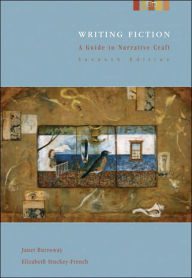 I’ve been reading Janet Burroway’s book, Writing Fiction: A Guide to Narrative Craft. I started it a few months back, and every so often I dip into it again. I’m not reading it linearly. I started with the chapters on character, then moved to theme and setting, and last week I read the first chapter of the book on “The Writing Process.”
I’ve been reading Janet Burroway’s book, Writing Fiction: A Guide to Narrative Craft. I started it a few months back, and every so often I dip into it again. I’m not reading it linearly. I started with the chapters on character, then moved to theme and setting, and last week I read the first chapter of the book on “The Writing Process.”
In that chapter, Burroway discusses the old advice to write what you know. She says that writing exactly what happened to you at a particular time is the least likely way to produce good fiction (her emphasis). She states:
“To the extent you want to capture ‘what really happened,’ you remove your focus from what will work as narrative.”
That sentence stopped me cold and made me think.
Burroway goes on to say,
“Between the fiction writer and reader it is the revelation of meaning through the creation of character, the vividness of scene, the effect of action that take priority over ordinary veracity.”
Writers, think about that. What happens to us in real life does not make good narrative. When we attempt to recount the literal truth, we lose the story and its meaning. Only by shaping our narrative can we get at what matters.
Real life doesn’t have a story arc. It doesn’t have characters designed to reveal a theme or an archtype. (Real people are too complex and inconsistent to be good fictional characters). Our real life takes place in settings that are messy and usually mundane.
Writers have to shape real life to make it into story. Burroway focuses on fiction writing, but she acknowledges that even in memoir and other nonfiction writing, which must “maintain a basis in fact,” some shaping is necessary to make it compelling to read.
“Even the most factual account of a personal experience involves choices and interpretations—your sister’s recollection of the same event might be entirely different.”
I repeat: What happens to us in real life does not make good narrative. As we tell our stories, whether we are telling them to ourselves, to friends and family, or fictionalizing them, we are making choices. We edit as we tell the story. And that becomes the basis for our memories, our myths, and our epics. There’s a reason that in French “histoire” means both story and history. Both story and history come from our editing of real life.
As I write about my life for this blog, I have found this to be true on a small scale. Some of my posts contain “truthy” dialogue—true to the spirit of what happened and how I and my family members interacted. But rarely could I attest that the words in quotes were actually spoken. Still, adding the dialogue makes a better story.
In other posts, where I’ve tried to be more factual, I find I’m fighting boredom—mine in writing about the event, and most likely the reader’s in reading about it. Sometimes humor doesn’t translate without the backstory. Sometimes an event that was meaningful to me seems pointless as I try to tell it to others. There’s no story in my telling, unless I reshape history.
I’ve written before that one nice thing about writing fiction is that I can make up the facts. I’m not bound to the literal truth, as I was as an attorney making a case. I can edit out the extraneous and the inconvenient.
And so I do, both in this blog and in my novels.
Our stories are more meaningful when we shape them, for ourselves and for each other. Unfortunately, we must always come back to real life. It may not make good narrative, but it has to be encountered and embraced as it is.
When have you edited a story from your life for others?




All the time, Theresa. I see it as a continuum of fiction. What you say about non-fiction and memoir is true. At the other end, true fiction does not avoid the facts of our (the writer’s) lives. And sometimes, when we write about ourselves, we may discover some meaning or remember something interesting that makes our writing more exciting. But, most of the time I lie.
There is one exception to embellishing the truth: I have heard an uncle of a friend of mine, relating his Korean war experience. He was not a writer, or a storyteller, or particularly a well-read man. His step-by-step description of a day in battle was absolutely riveting. He simply had good factual material.
Thanks for bringing the subject up, Theresa.
Dane,
I agree with everything you said. But I’ll bet the Korean War vet had in fact edited his chronicle of a day in battle. He probably took his great factual material and shaped it into the riveting story.
Thanks for the comment,
Theresa
Sounds like a good book. Think I’ll order it.
Yeah. So well put.
I can understand why that particular sentence stopped you cold, Theresa. Thanks for introducing us to this book. I haven’t heard of it, but it sounds like a good addition to my arsenal.